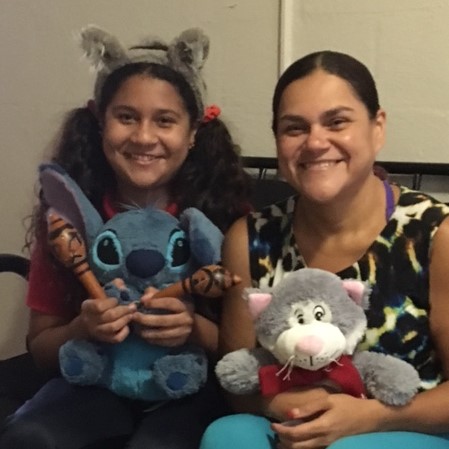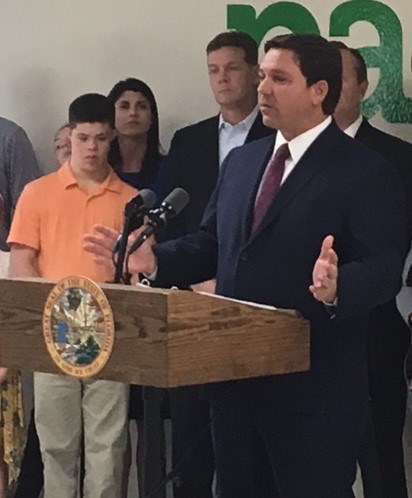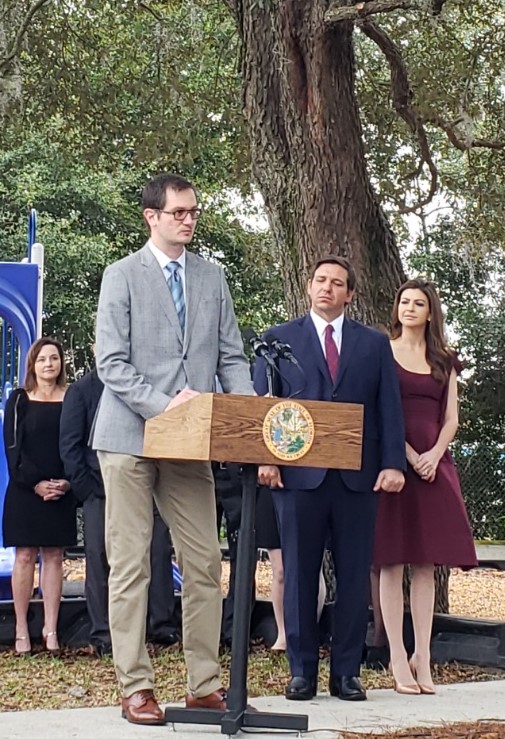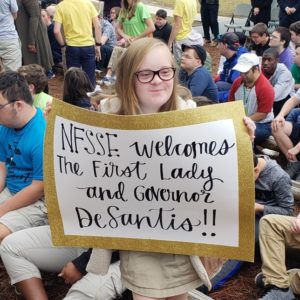
Aleena Martinez and her mother, Damaris Lorenzo, pose with Aleena’s beloved stuffed animals. Aleena is one of nearly 1,900 Florida students on a wait list for the Gardiner Scholarship for children and young adults with certain special needs. Florida Gov. Ron DeSantis recently vowed to end the wait list for 2019-20.
TAMPA – Aleena Martinez bounded into her family’s small, sparsely furnished living room as if it were an inflatable bounce house. A pair of blue rabbit ears crowned her dark curls and a menagerie of stuffed animals filled her arms.
The 12-year-old abandoned the animals on the couch and ran to the kitchen, where she began rummaging in the cabinets. She returned waving two boxes of cake mix – one vanilla, one brownie.
“We’ll bake one, then we’ll put them together,” Aleena told her mother, Damaris Lorenzo. “It’s science!” she announced with enthusiasm.
Aleena had just arrived home from her neighborhood school in east Tampa, a bundle of energy. She doesn’t dislike the school, but she’s finding it much different from the one she attended in her native Puerto Rico. Aleena, who is on the autism spectrum, is more comfortable in a smaller school setting. Distractions can trigger her post-traumatic stress disorder, a result of her family’s harrowing exodus to Florida in the wake of Hurricane Maria.
Her mother would have preferred to send Aleena to private school but cannot afford the tuition. The fifth-grader, along with nearly 1,900 other Florida children, has landed on a wait list for a Gardiner Scholarship for students with special needs in the wake of a demand that has outpaced state funding.
Damaris received encouraging news last week when Gov. Ron DeSantis pledged to eliminate the wait list for the 2019-20 school year. In speaking engagements in Jacksonville and Orlando, DeSantis said he has allocated enough money in the 2019 state budget to provide relief to families eager to find the most appropriate educational environment for their children.
Administered by the nonprofit Step Up For Students, which hosts this blog, the scholarship serves nearly 12,000 special needs students. Families can use the funds to pay for a variety of educational services, including private school tuition, tutoring and therapies, in addition to contributions to the Florida Prepaid College Program. The scholarship has enjoyed broad bipartisan support since its inception in 2014 and was expanded in 2015 to include students like Aleena who are on the autism spectrum. Those students now account for 66 percent of scholarship recipients.
Damaris learned about the scholarship when she saw it advertised on benches near her neighborhood.
She began envisioning using the money, which this school year averages $10,400, to pay for private school tuition and speech, occupational and group therapies for Aleena.
“I know of a private school here where she would be better off,” Damaris said. “It’s a smaller setting with one-on-one (instruction), and all the students get iPad tablets and there’s music and arts. I know she would like it there.”
Damaris didn’t leave Puerto Rico with Aleena and Aleena’s older brother voluntarily. Five days before Hurricane Maria devastated the island, she underwent a complicated abdominal surgery. When the island became flooded and lost power, Damaris scrambled to find hospital care. Her surgical wounds became infected, and without access to a doctor or antibiotics, her condition rapidly deteriorated.
“I caught sepsis in my whole body,” she said.
Damaris eventually found a doctor who approved her departure from the island, but travel out of Puerto Rico was limited. She had to leave her extended family behind.
After arriving in Tampa, Damaris spent a couple of months in a hospital while the family adjusted to its new home. None of it was easy.
“Aleena doesn’t really like a lot of change,” Damaris said, adding that post-hurricane, her daughter began experiencing hallucinations triggered by post-traumatic stress disorder. The girl is undergoing evaluation for bi-polar disorder and schizophrenia.
Despite Aleena’s challenges, Damaris is happy her daughter has made progress – and friends – at the neighborhood school. But she is convinced the private school will be a much better fit.
Meanwhile, Aleena who has disappeared into another room, suddenly reappears in the living room singing and “flossing,” doing the popular side-to-side dance move inspired by the online video game “Fortnite.”
She interrupts her recitation of things she loves, including painting and riding her purple Schwinn bicycle, with a panicked cry.
“The solar-system project! I left it at the therapist,” she says. “I need it; it’s a project. I don’t have any more paint.”
Damaris assures her they can return to the therapist’s office to retrieve the project, but the trip will have to wait. The weary mother, still recovering from a medical procedure she endured the previous day, sighs with a grin.
“It’s like this all the time,” she says.
A Gardiner Scholarship would provide some much-needed help.

Florida Gov. Ron DeSantis speaking today at Pace Brantley School outside Orlando, with Andy and Camille Gardiner and their son, Andrew
ORLANDO – Florida Gov. Ron DeSantis reiterated his pledge to end the waitlist for special needs children who have qualified for a state-funded scholarship at a second school visit Monday.
Following a morning stop at North Florida School of Special Education in Jacksonville, DeSantis traveled to Pace Brantley School in Longwood, outside Orlando.
Pace Brantley, a private school situated on a sprawling, 9-acre campus, specializes in educating children with a variety of special needs including attention deficit disorder, dyslexia and other learning disabilities.
“As long as I’m governor, don’t worry about the Gardiner scholarship,” DeSantis told a group of more than 50 parents, students and educators. “We’re going to be here and support it. We’ll stand behind the parents and students, because we believe in you. You have a lot to offer this state.”
The governor was accompanied by former Florida Senate President Andy Gardiner, Gardiner’s wife, Camille, and their son, Andrew. Gardiner led the legislative effort to establish the program to honor Andrew, who has Down syndrome.
“What’s special about the scholarship is that it allows parents to (steer) their child’s education,” Gardiner said. “Whenever they’re told that their child has a unique ability, they can know the governor and First Lady supports them.”
Nearly 1,900 Florida students are on the waiting list for the scholarship in the wake of a demand that has outpaced state funding. Administered by the nonprofit Step Up For Students, which hosts this blog, the scholarship serves nearly 12,000 special needs students.
Karen Revels, whose 6-year-old son Chancellor is on the waitlist, was among those who attended the event. Revels is paying about $12,000 a year out of pocket for Chancellor, who is on the autism spectrum, to attend Walden Community School in Winter Park.
She described Walden’s environment as calming, praising the smaller class sizes and Chancellor’s opportunities to “play and wiggle” and eat lunch outdoors.
“It is not chaotic at all, and his behavior issues at home have almost been eliminated,” Revels said. “He is happy to go to school, there isn’t pent-up anxiety and anger anymore, and it is all because of his daily environment.”
Revels said the family is depending on the Gardiner Scholarship to keep Chancellor in the setting that works best for him – a small private school.
“Academically, he is at the top of his class, and now he is also there emotionally,” she said. “Our other two children have thrived in a public-school setting, but it is not a one-size-fits-all model by any means.”
Another attendee, Ashley VanHees of Longwood, said she is grateful for the scholarship. Her son, Camden, 8, was developing normally until he was bitten by a tick at age 2. Within hours, he suffered a seizure and brain swelling. He eventually was diagnosed with a traumatic brain injury due to Lyme encephalitis.
VanHees said Camden is still fighting Lyme disease but has made exceptional strides, thanks in part to the Gardiner Scholarship. He is now a second-grader at Advance Learning Academy in Fern Park.
“We were able to enroll Camden in a private school where he has thrived and shown remarkable improvement,” she said. “His IQ scores have increased by 20 points and that is just the beginning. We know that we have a long road ahead, but we feel confident in our journey knowing that we have the support from the scholarship to assist along the way.”
VanHees said she can’t imagine how the family would manage without the scholarship.
“I do know that this great education he is currently receiving would be out of reach,” she said. “My hope is that all of the families and children that remain on the scholarship waitlist are able to receive the opportunities that we have benefited from.”

Adam Blaszkiewicz, a parent on the Gardiner Scholarship waitlist, speaks to the gathered crowd at North Florida School of Special Education, flanked by Gov. and First Lady DeSantis.
JACKSONVILLE – Florida Gov. Ron DeSantis on Monday promised to eliminate the wait list for children who have qualified for a state-funded scholarship for students with special needs.
DeSantis, flanked by First Lady Casey DeSantis and Florida Education Commissioner Richard Corcoran, visited the North Florida School of Special Education where he addressed parents of students awaiting a Gardiner Scholarship, the nation’s largest education savings account program, as well as those families who have benefited from it.
“In the budget just released, I’ve allocated enough money to get rid of the waitlist for the Gardiner Scholarship entirely,” DeSantis told the crowd of roughly 150. “The Gardiner program has been a proven success, and parents need to find the right environment for their kids.”
DeSantis said he looks forward to welcoming in the next school year the nearly 1,900 Florida students currently on the list in the wake of a demand that has outpaced state funding. Administered by the nonprofit Step Up For Students, which hosts this blog, the scholarship serves nearly 12,000 special needs students.

A student at the North Florida School of Special Education holds a sign greeting the governor and first lady.
Families can use the funds to pay for a variety of educational services, including private school tuition, tutoring and therapies, in addition to contributions to the Florida Prepaid College Program. The scholarship has enjoyed broad bipartisan support since its inception in 2014 and was expanded in 2015 to include students on the autism spectrum, who now account for 66 percent of scholarship recipients.
Corcoran praised all who champion education opportunities for Florida’s youth.
“Human dignity comes from a great education, and everyone deserves that,” he said.
Adam Blaszkiewicz, whose son Robert is a second-grader at North Florida School of Education, was one of several parents who spoke at the event. Blaszkiewicz recently moved to Florida from North Carolina and is paying out of pocket – about $7,000 for half a year – while his son remains on the waiting list.
“This program provides parents with both means and flexibility to address their children’s needs,” Blaszkiewicz said. “More importantly, it ensures that parents do not have to face a gut-wrenching decision of foregoing or delaying an intervention that could change their child’s life for the better.”
Like many parents of special needs students, Blaszkiewicz is aware that timing is critical for children like Robert.
“Those funds (would) not only allow us to place our children in an educational setting where they are most likely to succeed as early as possible, but they also free up our personal budgets to provide additional therapy services, as well as help us plan and save for the future,” he said.
Tim Crass, whose son Drew has attended North Florida School of Education for three years on the scholarship, said it has been instrumental in helping Drew, who has Down Syndrome, stay “up to speed” in school. The roughly $10,000 scholarship pays for about two-thirds of Drew’s tuition.
“The Gardiner Scholarship is a win-win for both the families who want to send their children to North Florida and the school itself, as it has been able to grow and accommodate even more students,” Crass said. “Without the Gardiner Scholarship, families who need schools like North Florida wouldn’t be able to get the education for their children that they truly deserve, and schools like North Florida wouldn’t be able to continue providing the amazing educational experience they are providing today.”
The Rev. Jose Suarez, founder and director of Hope Youth Ranch in Hudson, said after the event that the governor’s announcement “was like a breath of fresh air.”
“It just brings hope,” Suarez said. “Our parents have to make decisions on whether to use their own money. This opens up a lot of doors for possibility and relief, not just schooling but therapies as well -- the total needs of their child.”
UPDATE: Gov. DeSantis continued his Gardiner Scholarship tour in the afternoon, speaking at Pace Brantley School in Orlando. You can read our coverage of that event HERE.